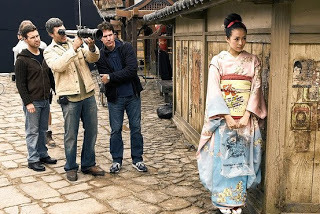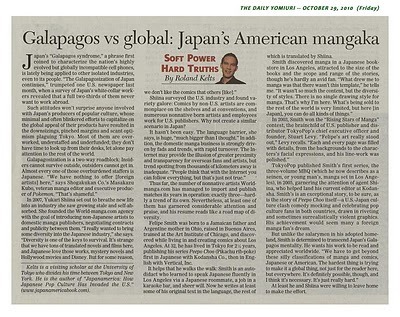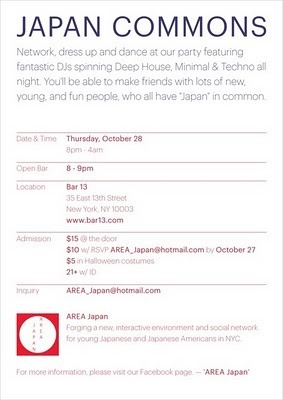Roland Kelts's Blog, page 81
November 8, 2010
NHK shoot today
My Life (on NHK shoot today)
My review of "Butterfly's Sisters" for The Wall Street Journal
 A Haunting Woman
By ROLAND KELTS
A Haunting Woman
By ROLAND KELTSI was recently interviewed by an American television reporter about a popular simulated-dating videogame in Japan called Love Plus +. The game offers players a selection of cute virtual girlfriends for dates and relationships. Once the player has chosen his partner, the game's software constantly challenges him to find ever more effective ways of romancing her and keeping her happy.
At one point, the American reporter wondered why the virtual females in the game looked so young, docile and submissive. Was it OK in Japan, she asked me, a Japanese-American living in Tokyo, for men to pursue underage women?
It's not, of course. Like the famous Hello Kitty character, the game's girlfriends are designed to exemplify the Japanese cultural aesthetic of kawaii—adorably, irresistibly cute and dependent figures in need of attentive care and affection. It is precisely the "mincing, simpering personification of female subservience to the male" that abounds in stereotypes of Japan, according to Yoko Kawaguchi, a Japanese woman raised in North America. This misperception irritates Ms. Kawaguchi so much that she wrote a book about it.
Butterfly's SistersBy Yoko Kawaguchi
Yale, 342 pages, $45
While "Butterfly's Sisters" is a sweeping historical account of Western impressions of Japanese women, it focuses on an icon that long preceded Hello Kitty and virtual girlfriends—the kimono-clad geisha. Ms. Kawaguchi is most interested in the era when Japan officially opened to Western trade and diplomacy in the mid-19th century. This period, she notes, marks "the beginning of the long-continuing debate over the precise nature of the geisha's occupation." In other words: "Were they or weren't they," as the book's first chapter-title asks, high-class prostitutes? [more @ WSJ]
November 5, 2010
Japan's American mangaka: Felipe Smith



SOFT POWER HARD TRUTHS / Galapagos vs global: Japan's American mangaka
Roland Kelts / Special to The Daily Yomiuri
Japan's "Galapagos syndrome," a phrase first coined to characterize the nation's highly evolved but globally incompatible cell phones, is lately being applied to other isolated industries, even to its people. "The Galapagosization of Japan continues," trumpeted one U.S. newspaper last month, when a survey of Japan's white-collar workers revealed that a full two-thirds of them never want to work abroad.
Such attitudes won't surprise anyone involved with Japan's producers of popular culture, whose minimal and often blinkered efforts to capitalize on the global appeal of their products have resulted in the downsizings, pinched margins and scant optimism plaguing Tokyo. Most of them are overworked, understaffed and underfunded; they don't have time to look up from their desks, let alone pay attention to the rest of the world.
Galapagosization is a two-way roadblock: Insiders cannot survive outside, outsiders cannot get in. Almost every one of those overburdened staffers is Japanese. "We have nothing to offer [foreign artists] here," says Shogakukan Co.'s Masakazu Kubo, veteran manga editor and executive producer of Pokemon. "That's shameful."
In 2007, Yukari Shiina set out to breathe new life into an industry she saw growing stale and self-absorbed. She founded the World-manga.com agency with the goal of introducing non-Japanese artists to domestic manga publishers, negotiating contracts and publicity between them. "I really wanted to bring some diversity into the Japanese industry," she says. "Diversity is one of the keys to survival. It's strange that we have tons of translated novels and films here, and Japanese love those works, mystery novels and Hollywood movies and Disney. But for some reason, we don't like the comics that others [like]."
Shiina surveyed the U.S. industry and found variety galore: Comics by non-U.S. artists are commonplace on the shelves and at conventions, and numerous nonnative born artists and employees work for U.S. publishers. Why not create a similar scenario in Japan?
It hasn't been easy. The language barrier, she says, is huge, "much bigger than I thought." In addition, the domestic manga business is strongly driven by fads and trends, with rapid turnover. The Internet may provide the illusion of greater proximity and transparency for overseas fans and artists, but trend spotting from thousands of kilometers away is inadequate. "People think that with the Internet you can follow everything, but that's just not true."
Thus far, the number of nonnative artists World-manga.com has managed to import and publish matches its years in operation: exactly three--hardly a trend of its own. Nevertheless, at least one of them has garnered considerable attention and praise, and his resume reads like a road map of diversity... [more here, and @
November 4, 2010
Two friends, two films: NYC this Sat., 11-6
 First up, my dear friend Chisa Hidaka's three-minute media meditation on improvisatory dancing with spinner dolphins in the Pacific, Together: Dancing with Spinner Dolphins, will be screened at noon on Saturday, November 6, as part of the Big Apple Film Festival @ Tribeca Cinemas.
First up, my dear friend Chisa Hidaka's three-minute media meditation on improvisatory dancing with spinner dolphins in the Pacific, Together: Dancing with Spinner Dolphins, will be screened at noon on Saturday, November 6, as part of the Big Apple Film Festival @ Tribeca Cinemas.
Next, another dear friend, Linda Hoaglund, premieres her new documentary, ANPO: Art x War, a wrenching look at the 50 year-old US-Japan Mutual Security Treaty, consigning tens of thousands of US troops to Japan in perpetuity, as seen through the eyes of the Japanese artists, writers and musicians who fought and continue to resist its stranglehold on the archipelago. Linda will be on hand for the 2 p.m. screening this Saturday, November 6, at the Big Apple Film Festival @ Tribeca Cinemas.
November 3, 2010
Twig,1995-2010. Our Beautiful Boy. We miss you, and we always will.
October 26, 2010
Anime, manga and cosplay party in NYC, Oct. 28
'Hear, hear (sans irony)!'

October 18, 2010
Yoko Ono talks terrorism in Paper Sky
 Yoko Ono can't slow downJOURNEYWOMAN: YOKO ONO
Yoko Ono can't slow downJOURNEYWOMAN: YOKO ONO"Yoko Ono's public persona is one part mercurial, two parts mysterious. She is known for speaking her mind and making bold gestures as an artist and activist. She also has a reputation for being willfully opaque behind her ever-present sunglasses- especially when confronted by the literal minded. Ono has spent a lifetime facing down vitriolic accusations, but no one can accuse her of sitting still. I interviewed her in New York just before she flew to London, where she was due to present a peace prize, give a speech or three, and premiere some of her latest work.
Roland Kelts: I feel like I've traveled a lot, but when I look at the many journeys you've taken across borders of culture, sex, politics, art and spirit- let alone time and space- I'm humbled.
Yoko Ono: The most interesting journey I have made was not the physical one, but the mental and spiritual. Right now, I am still busy making the journey. It's not the time yet to summarize it.
R: Maybe the world is finally catching on to your spiritual journey. They are cheering your work in the East and in the West. I've heard that you will be featured in the upcoming Shanghai Biennale.
Y: So I've heard.
R: But for so many years, you were battling the world's stereotypes: of women, of Asians, and as John Lennon's wife. Do you feel that this latest embrace of you and your work is more genuine and complete?
Y: I won't go that far to say that it is genuine and complete. What are you saying?! As you know, nothing is ever totally genuine or complete.
R: Ah, yes. Nothing is. But you are no longer so easily identified as an "outsider," and that may pose new challenges.
Y: It may.
R: Leaving Japan and living in Ameirca made you a cultural and racial outsider, at least in the early years.
Y: I have never left Japan. Nor have I decided to limit myself to living in the US. In my mind I live in all the places I've been and not been to.
R: When you spoke at the Japan Society in New York a few years ago, you said that you visited Japan frequently and found the culture changing in a healthy way.
Y: It is changing into a more open society, where people are not afraid to speak out. That's beautiful..." [more @ Paper Sky]
JP version:
旅の女 オノ・ヨーコROLAND KELTS、 2010年10月11日 AMERICA,JP INTERVIEW, MUSICオノ・ヨーコについて我々が抱くイメージは2つ。一つは、気まぐれで自由奔放な一面、もうひとつはミステリアスな一面。アーティスト、また活動家として、自身の内面を大胆な身振りを交えて包み隠さず語るかと思えば、まるで彼女のトレードマークであるサングラスの奥に消え去ってしまったかのように意識的に物事を曖昧にすることもある。これは、特に想像力の欠如した相手と対峙したときに起こる特徴だ。ヨーコは、これまで彼女に対する辛らつな批判と立ち向かってきた。そして、誰もが彼女の存在を否定しなかったのだ。彼女自身が制定したピース・プライズの授与を行なうことになっているロンドンまで、彼女を追い掛けた。
ローランド・ケルツ(以下R):僕自身、これまで本当に沢山旅をしてきたと思うんですが、ヨーコさんが今まで経験されてきた、文化や性別、アート、そして精神的なものの領域さえも越えた旅を考えると・・・時間や場所は別にしてですが、なんだか僕の旅の経験なんて、たいしたことではないなぁなんて思うんです。
オノ・ヨーコ(以下Y):私にとって一番興味をそそられた旅は実質的な旅行ではなくて、精神的でスピリチュアルな旅です。今まさにこの時も、私は旅を続けているのです。まだ、この度を集約して、かいつまんでお話する時期ではありませんが。
R:おそらく、ようやくみんながあなたの精神的な旅の領域に追いついてきたのだと思います。アジアでも欧米でも、あなたの作品は賞賛されています。今度の上海ビエンナーレでは、特集が組まれるそうですね。
Y:ええ、そのように聞きました。
R:でも何年もの間、あなたは社会のステレオタイプ的なものと戦ってきましたよね、たとえば女性、アジア人、それとジョン・レノンの妻として人々が抱く概念に対しても。最近のあなた自身、及びあなたの作品が受け入れられている事実は、疑いようもなく明白な真実であるとお考えですか。
Y:疑いもなく明白だなんて、そこまではいいませんが… 疑いようもない明白なものなんてこの世に存在しないでしょう。
R:ああ、そうですね… そんなものはありませんね。でも、いまあなたはもはやアウトサイダー的な存在ではないと思うんです。その事実について、今後何か新たな展開が起こるのではないかと思っているのですが。
Y:そうかもしれませんね。
R:日本を後にしてアメリカで暮らすということは、少なくとも最初の数年間は、文化的にも日本人としてもあなたをアウトサイダーにしたと思うのですが。
Y:私は日本を後にしたとは考えておりません。同時に、自分自身、アメリカで暮らしていくと決意したわけでもないのです、私は、今まで行ったすべての場所、また今まで一度もいったことが無い場所でも暮らしているという感覚でいます。
R:2、3年前、ニューヨークの日本協会でお話をされたときあなたは、度々日本を訪れて、そのたびごとに彼の地の文化が健全な方向に変化してきている、とおっしゃっていました。
Y:ええ。どんどん解放された社会に変化していると思っています。みんなが自分の意見を躊躇せずに言える環境に。素晴らしいことです。[more @ Paper Sky]
October 15, 2010
October 14, 2010
Qantas Sucks

Just called Qantas tonight to get my miles moved to my AA account. Their staff in LA told me a quick phone call to the US offices would do the trick. Tonight I was told, "no, we can't do that, you'll need to call Qantas headquarters in AU."
You might think--after Qantas stuck me in Sydney Airport for eight hours on Sept. 29, lost my luggage, delayed my flight from Canberra to Sydney, and canceled my flight to Tokyo earlier this month, causing me to lose business, meetings and money, that they might be able to accommodate a quick computerized gesture.
No, not Qantas.
What absurd incompetence.
I don't like accusing big companies of idiocy, because I know that their individual staffers are hard-working people, and everyone on staff at Qantas was polite, smart and kind. But the company is an insult to working business travelers everywhere.
I won't ever patronize them again, and am warning all of my partners.
Beware. Avoid Qantas until they grow up.








